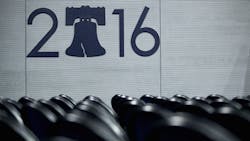Before the bullhorns and big speeches at the Democratic National Convention on Monday, manufacturing advocates gathered nearby at the Philadelphia Museum of Art to talk about trade policy and the future of U.S. manufacturing.
It was the second of two events the Alliance for American Manufacturing--a non-profit, non-partisan partnership between U.S. manufacturers and steelworkers--held around the presidential nominating conventions. The first was a "Keep It Made in America" booth outside the Republican National Convention in Cleveland last week that featured a life-size 3-D printed figure of Donald Trump.
This time, Gene Sperling, economic advisor to presumed Democratic nominee Hillary Clinton, laid out his priorities for “rebuilding the middle class,” which included:
- Enforce the trade regulations already in place but under-enforced, especially when it comes to China.
- Appoint a special trade prosecutor who reports directly to the president. That person’s sole job should be enforcement, he said, and for effective enforcement, resources should be tripled at least. The enforcement team should include people fluent in dialects particularly in China, to fully understand the nuances of local contracts and policies.
- Kill the Trans Pacific Partnership. Sperling said that Clinton, who previously supported the TPP, is now against it because “this is not where we should be focusing our energy.” Instead, he said, the party should be united on issues that affect economic progress, such as infrastructure, and those that directly affect workers, like family medical leave.
- Take away tax benefits retroactively from companies that receive tax incentives for research and development but take their manufacturing offshore.
- Charge an exit tax to companies that relocate their headquarters overseas.
Michael Bloomfield, executive vice president of opinion research firm the Mellman Group, talked about how Americans’ sentiment on trade has shifted since the last election, from dissatisfaction with U.S. trade policies to outright anger.
“Romney and Obama focused on getting tough on trade in 2012, but Trump attracts the press,” he said.
Mike Langford, president of the Utility Workers Union of America,” said to encourage more manufacturing , U.S. infrastructure needs an overhaul.
“The Civil Engineering Society rates our water and wastewater systems a D-, water and gas a D, and electric a D+,” he said. “Hurricane Sandy showed how vulnerable our utilities are … If I’m going to build a factory, I want to know, ‘Can you guarantee I’ll have safe water, gas and electricity?’ A lot of places, you can’t guarantee that.”
Leo Gerard, president of the United Steelworkers Union, told the crowd that “seeing what’s happened to manufacturing in the last 25 years has been heartbreaking, and you can’t get away from the fact that many of the trade deals we’ve seen have been at the heart of the loss. What Carrier did to their workers (in Indiana) was a slap in the face with a dead fish.
“What’s going to happen in the next election cycle is going to in many ways determine the industrial future of America,” he continued.
Trump’s campaign brought national attention to the plight of the Carrier workers. But Gerard thinks Trump is not the answer—that he’s using the language of Bernie Sanders, but his actions tell another story.
“I don’t come close to believing anything Donald Trump says about manufacturing, about trade,” Gerard said.
About the Author

Laura Putre
Senior Editor, IndustryWeek
As senior editor, Laura Putre works with IndustryWeek's editorial contributors and reports on leadership and the automotive industry as they relate to manufacturing. She joined IndustryWeek in 2015 as a staff writer covering workforce issues.
Prior to IndustryWeek, Laura reported on the healthcare industry and covered local news. She was the editor of the Chicago Journal and a staff writer for Cleveland Scene. Her national bylines include The Guardian, Slate, Pacific-Standard and The Root.
Laura was a National Press Foundation fellow in 2022.
Got a story idea? Reach out to Laura at [email protected]
